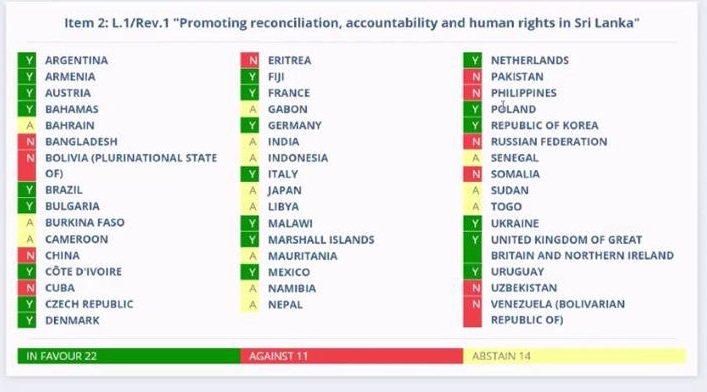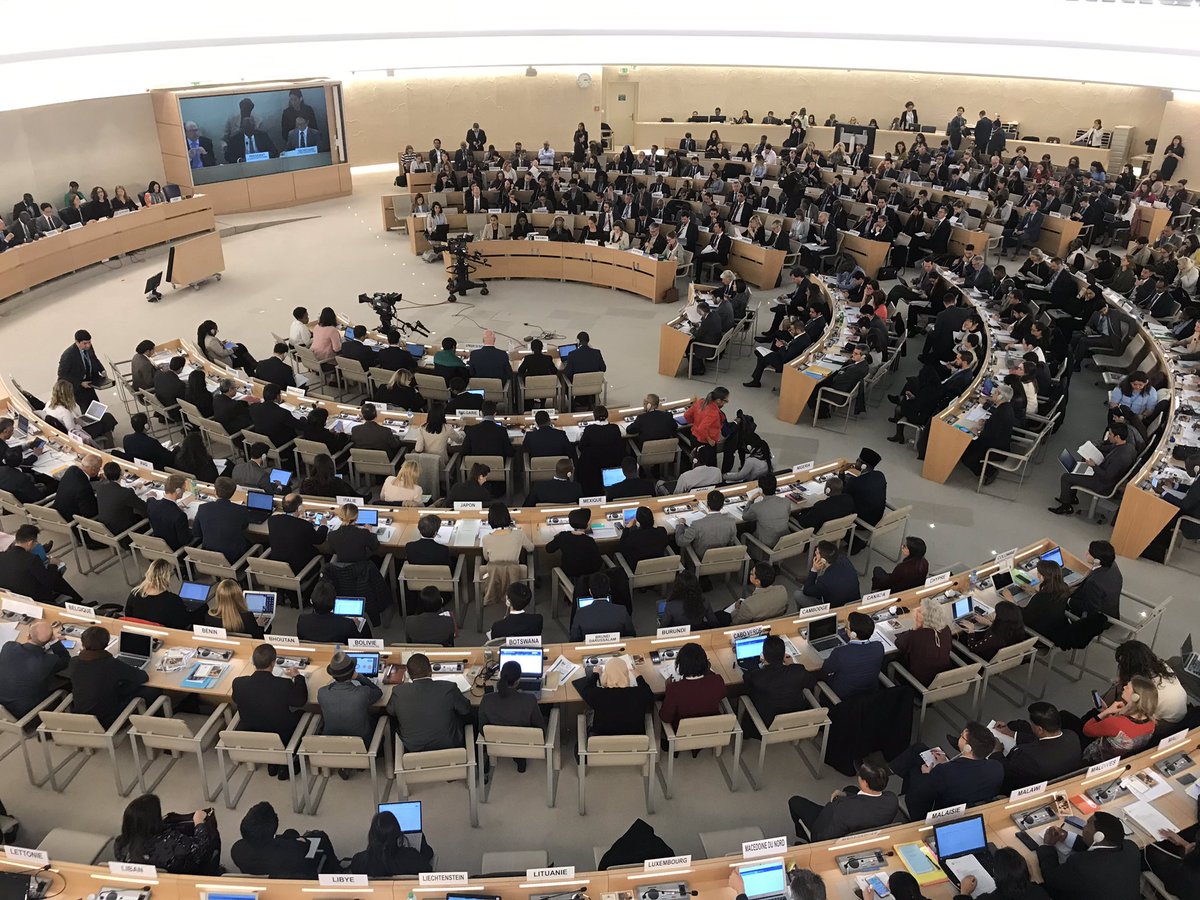![]()
The United Nations Human Rights Council has passed a resolution on accountability and justice in Sri Lanka, by 22 votes in favour to 14 votes against and 11 abstentions.
The resolution, adopted earlier today, will mandate the Office of the High Commissioner for Human Rights to "collect" as well as "consolidate, analyse and preserve” evidence that could be used in future war crimes trials.
The resolution also “expresses serious concern at the trends emerging over the past year, which represent a clear early warning sign of a deteriorating situation of human rights in Sri Lanka” and highlights “ongoing impunity and political obstruction of accountability for crimes and human rights violations”.
More than US$ 2.8 million has been budgeted for the collection and analysis of evidence, with a report to be produced and presented to the Council in 2022.
See the full text of the resolution here.
See the full list of member states that voted on the resolution below.

A time buying exercise?
The resolution was bitterly opposed by the Sri Lankan state, which had been lobbying member states around the world for months to vote against it. In the aftermath of the vote, Sri Lanka’s foreign minister lambasted the resolution and even claimed that it had “failed”.
Tamils on the other hand had been disappointed by the resolution, which they stated fell short of UN High Commissioner Michelle Bachelet's recommendations. Earlier this year, her reported called on member states to consider asset freezes and travel bans on Sri Lankan officials credibly accused of human rights abuses and to consider “steps towards the referral of the situation in Sri Lanka to the International Criminal Court (ICC)."
Speaking to Tamil Guardian, Kumaravadivel Guruparan, former Senior Lecturer in Law at the University of Jaffna, said that "the bona fides of the resolution will depend on whether there is genuine progress towards prosecutions."
"Otherwise all this talk of evidence collection will be merely a time buying exercise, a place holder because the Core Group doesn't have the political will for anything real. I don't think victims on the ground can be pacified anymore by merely keeping Sri Lanka on the agenda in Geneva," he added.
Speaking to the BBC this morning, Bachelet said that she welcomes the decision to “continue its monitoring of human rights in Sri Lanka and pursue accountability for past crimes”.
“I salute the courage and commitment of victims from all communities in Sri Lanka in their pursuit of truth and justice," she added, noting that she hoped Sri Lanka would "change course from its current policies" and "ensure full protection of minorities, human rights defenders and the media".
“It is hugely significant for victims,” said Executive Director of the ITJP, Yasmin Sooka. “It really is a recognition that at the domestic level, processes have failed and there is no real hope that victims will access justice,” she told Reuters.

A tense virtual vote
Several member states spoke as the resolution was being presented this morning. The United Kingdom said it was “honoured” to table the resolution alongside Canada, Germany, Malawi, Montenegro and North Macedonia.
Sri Lanka meanwhile told the Council that the resolution was “dangerous”, as it looked to rally its allies. China, Pakistan, Venezuela, Russia, the Philippines and Cuba all spoke in support of Sri Lanka this morning, with many calling for the resolution to be rejected.
India’s vote at the Council was being keenly watched by all sides, after the Sri Lankan government had repeatedly claimed it would vote against the resolution, whilst the Tamil National Alliance said it had “high hopes” that New Delhi would vote in favour of it.
The vote comes on the back of a series of diplomatic snubs from Sri Lanka to its bigger neighbour, which has led to growing tensions across the Palk Strait. Earlier in the week, politicians from across Tamil Nadu had urged the Central government to vote in favour of the resolution, and for justice and accountability for Eelam Tamils.
In the end however, India decided to abstain from voting, with the country’s representative at the Council stating it would continue to urge the Sri Lankan government to “address the aspirations of the Tamil community”.
"India as usual wants to show it's friendly face to both Tamils and the government of Sri Lanka,” commented Guruparan. “But Tamils know that over the last 12 years that the Indian government have consistently, irrespective of which party is in power, have diffused any international progress made on accountability."
"India's 'sitting on the wall' policy neither helps the Tamils nor itself. Sri Lanka continues to snub India on all fronts as was seen in the withdrawal of the East Container Terminal project," he added.
Commenting on the passed resolution, the US Mission at the United Nations in Geneva said that it highlights “continuing impunity for serious crimes and abuses and authorizes collection of evidence for future prosecutions”.
The important resolution on Sri Lanka just adopted at #HRC46 highlights continuing impunity for serious crimes and abuses and authorizes collection of evidence for future prosecutions.
— U.S. Mission Geneva (@usmissiongeneva) March 23, 2021
Germany’s Ambassador to Sri Lanka Holger Seubert called the resolution “important” in a tweet shortly after the vote.
The UN Human Rights Council today adopted an important Resolution on Sri Lanka. 22 HRC members voted in favour, 11 against and 14 abstained.
— Ambassador Holger Seubert (@GermanAmbColo) March 23, 2021
LIVE COVERAGE
See more live coverage from our Twitter account below.
LIVE - UN Human Rights Council due to vote on new resolution on Sri Lanka
— Tamil Guardian (@TamilGuardian) March 23, 2021
We will be tweeting live as the UN Human Rights Council is set to vote on a resolution on justice and accountability in Sri Lanka shortly.https://t.co/qRsI06dMzq pic.twitter.com/F6OLxAcFG0
